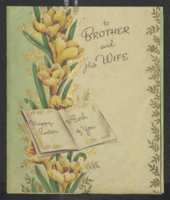Search the Special Collections and Archives Portal
Search Results
Aplin Family Scrapbooks
Identifier
Abstract
The Aplin Family Scrapbooks (1927-1971) consists of four handmade scrapbooks compiled by Hilda Aplin. The scrapbooks contain photographs, correspondence, newspaper clippings, and handwritten captions. The majority of the collection focuses on Hilda and Charles Aplin’s involvement in the Fraternal Order of Eagles and Las Vegas Eagles Auxiliary #1213. Also included is a photograph album that details the family’s activities from 1927 to 1959, including notable locations around Las Vegas, Nevada such as Lake Mead, Hoover Dam, Mt. Charleston, and annual Helldorado parades.
Archival Collection
Walking Box Ranch Collection
Identifier
Abstract
The Walking Box Ranch Collection (1917-2011) includes material collected by the University of Nevada, Las Vegas (UNLV) Public Lands Institute on the Searchlight, Nevada ranch. Materials include a maps related to the construction and operation of the ranch, a pair of chaps owned by Rex Bell, Jr., and color slides of the ranch. Also included are photographic prints of Rex Bell and Rex Bell, Jr., and newsclippings related to the film and political career of Rex Bell. A small number of newsclippings pertain to the career of Rex Bell, Jr.
Archival Collection
Flora Dungan Papers
Identifier
Abstract
Flora Dungan Papers (1929-1974) contain high school and university records, certificates, newspaper clippings, press releases, notes, correspondence, and booklets about her life and political activism in Nevada. Also included are Legislative materials, an audio cassette tape, a copy of the Nevada Constitution, and an oil painting of Flora Dungan.
Archival Collection

Christian Chan oral history interview: transcript
Date
Archival Collection
Description
Oral history interview with Christian Chan conducted by Cecilia Winchell, Jerwin Tiu, and Stefani Evans on May 06, 2022 for the Reflections: the Las Vegas Asian American and Pacific Islander Oral History Project. In this interview, Chan begins by describing her childhood in Hong Kong and later moving to San Francisco, California with her family, then to Las Vegas, Nevada in 1965. She recalls attending Sunrise Acres and Roy Martin Middle School before graduating from Valley High School as valedictorian. In college, Chan attended the University of Nevada, Las Vegas (UNLV) and graduated with a degree in engineering. After college, she found work in the Las Vegas Valley Water District and became the first woman engineer. During her five years there, she excountered subtle sexism for the first time. Chan continues the interview by describing her work while she lived in California, as well as her years internationally living in the Philippines as well as Ecuador. Throughout the interview, Chan touches on topics ranging from identity, to her impressions of the different generations, discrimination, and the growth of Las Vegas.
Text

Lisa Song Sutton oral history interview: transcript
Date
Archival Collection
Description
Oral history interview with Lisa Song Sutton conducted by Cecilia Winchell, Vanessa Concepcion, and Stefani Evans on November 19, 2021 for Reflections: The Las Vegas Asian American and Pacific Islander Oral History Project. Lisa shares her personal history and childhood memories moving from Seoul, South Korea to Sierra Vista, Arizona at the age of five. She discusses her educational and professional pursuits in business litigation, bankruptcy law, entrepreneurship, modeling, and her time in the pageant circuit winning Miss Vegas and Miss Nevada in 2013. Lisa also talks about her activism and community engagement efforts to empower women within Las Vegas. She concludes her interview with insight into her Korean heritage, traditional celebrations, and religion.
Text

Nadine Cracraft oral history interview: transcript
Date
Archival Collection
Description
Oral history interview with Nadine Cracraft conducted by Barbara Tabach on November 27, 2017 for the Remembering 1 October Oral History Project. In this interview, Nadine Cracraft discusses the development of her career in child and family therapy after moving to Las Vegas, Nevada in 1991. While describing the work she has done, Cracraft talks about the volunteer counseling services she provided for the survivors of the October 2017 Las Vegas mass shooting. She specifically mentions working with Aria staff members who were struggling with the aftermath of the shooting as well as her time spent working with First Friday to help those impacted by the traumatic event. Throughout the interview, Cracraft explains the different ways people manage their post-traumatic stress disorder and how this knowledge influenced her care of the survivors.
Text
Jeff Reiman (The Broadband Group) oral history interview conducted by Kelliann Beavers and Elia Del Carmen Solano-Patricio: transcript
Date
Archival Collection
Description
From the Lincy Institute "Perspectives from the COVID-19 Pandemic" Oral History Project (MS-01178) -- Business interviews file.
Text

Mabel Hoggard: greeting cards (folder 3 of 3)
Date
Archival Collection
Description
Folder of materials from the Mabel Hoggard Papers (MS-00565) -- Personal papers file. This folder contains greeting cards, postcards, letters, and invitations from friends, family, and some organizations.
Mixed Content

Transcript of interview with Jan Kennedy by Barbara Tabach, September 7, 2011
Date
Archival Collection
Description
Jan Kennedy was born (1924) Janet Parmelee, the daughter of a Connecticut physician and a homemaker. In high school she met Norman Kennedy, who she would marry after both had attended college and to whom she was married for 64 years. Until 1963, their roots seemed to be taking hold in the Seattle area. That is until Norm was offered an attractive career opportunity as a weather man at the Nevada Test Site. They settled in and enjoyed a zest-filled life with their four sons and a dynamic group of friends who they often entertained at their cabin in Mount Charleston. In addition, Jan managed to volunteer for a list of organizations including UMC Hospital/Southern Nevada Memorial Hospital; Clark County Museum Guild; Salvation Army Women's Auxiliary; church deacon; Assistance League; Red Hats—keeping herself ever busy and joyfully satisfied.
Text

Transcript of interview with Hugh E. Key by Bob Bush, February 21, 1980
Date
Archival Collection
Description
On February 21, 1980, collector Bob Bush interviewed porter and retired military man, Hugh E. Key (born on November 17th, 1919 in Fordyce, Arkansas) in Las Vegas, Nevada. This interview covers the life of a Las Vegas old-timer. Hugh Keys’ wife, Mrs. Key, is also present during the interview and offers a few remarks.
Text
